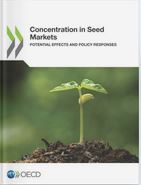 Topics Topics |
|
|
|
 Species Species |
|
|
|
|
|
Chile - Devastating floods and landslides damage 28 percent of agricultural crops in northern regions
Chile
April 10, 2015
Source: USDA/FAS GAIN report CI 1505
Executive Summary:
On March 24-25, 2015 Chile’s northern regions were hit by torrential floods and mudslides. For nearly ten years this region has been hit by a drought. The floods have reportedly wiped out the irrigation infrastructure and farmers and the Government are scrambling to put together a plan, as it is also dealing with deaths, missing and over 30,000 displaced persons.
In spite its semi-arid desert climate, Chile’s Third Region (Atacama) produces nearly 12% of its overall fresh table grape production. According to the Ministry of Agriculture (MOA), during the first two months of 2015, the Atacama region exported US$106 million of fresh fruit.
General Information:
Before the storm hit the region, it had about 11,160 hectares (ha) of fruit orchards planted, out of which nearly 8,000 ha were planted with table grapes. This accounts for approximately 16 percent of the total planted area throughout Chile. However, 95 percent of the crop had been harvested prior to the floods. Thus losses for this harvest will be nominal. In addition, 2,400 ha were planted with olive trees and the remaining hectares with other fruits like pomegranate, avocados and different vegetables. Out of the total irrigated area, 3,162 hectares or 28 percent of the planted agricultural area has been severely damaged in the region.
According to the President of the Fruit Producers Association (FEDEFRUTA), some farmers report total losses of their table grape orchards. Nearly 12,000 people work in the table grape sector in the Atacama region alone. However, at the moment of the disaster, around 4,000 persons were working to complete the table grape harvest for Red Globe variety.
Irrigation Infrastructure Damaged
The President of FEDEFRUTA reported that he visited the city of Copiapo on April 8 and witnessed the effects of the severe flooding on the farms and orchard. Farms reported that they lost their irrigation infrastructure. News sources indicate that the President of the Huasco River Irrigation Board (HRIB) in the Huasco River Valley reported that damages concentrated in the counties of Alto del Carmen, Vallenar and Freirina.
According to the first round of estimates compiled by the HRIB, the 53.5 percent of the run-of-river intake of the valley are totally destroyed, affecting 78 percent of the total irrigated area. Out of a total of 2,900 hectares planted in the Huasco Valley, 2,262 hectares are affected by the natural disasters and its irrigation infrastructure has been wiped out. HRIB is working with the Ministry of Agriculture, as surviving crops are at risk to die in 15 days due to the lack of irrigation available. In this valley are 1,800 farmers, most of them with farms between 10 and 20 hectares. Prior to the flooding, their farms depended on 100 canals which are now destroyed. HRIB estimates that repairs of the canals and river beds will cost around 3 billion pesos (or approximately 5 million dollars).
Another city, the Valley of Copiapo is similar. Out of a total of 8,260 hectares of irrigated land, 900 hectares were heavily damaged according to Agricultural Association of the Copiapo Valley. Just like the other cities in the region, all irrigation infrastructures have been destroyed.
More news from: USDA - FAS (Foreign Agricultural Service)
Website: http://www.fas.usda.gov/ Published: April 16, 2015 |
|
|
|
Better Food Venture's
AgTech Landscape 2019

|
| |
|
2019 THRIVE Top 50
landscape map

|
| |
|
Concentration in Seed Markets - Potential Effects and Policy Responses

(OECD December 2018)
|
|
Visualizing Consolidation
in the Global Seed Industry
1996–2018

Seed Industry Structure
1996-2018
Phil Howard
Associate Professor
Michigan State University
|
|
2017 Seed Company Family Tree
Ccreated Septebmer 2017
by Robert Walsh
WaSoo Farm, Elk Point, South Dakota |
 |
Syngenta Brands Family Tree
Ccreated January 2017 by Robert Walsh, WaSoo Farm, Elk Point, South Dakota
|
 |
| |
Rabobank's
World Vegetable Map 2018 |
 |
|
|